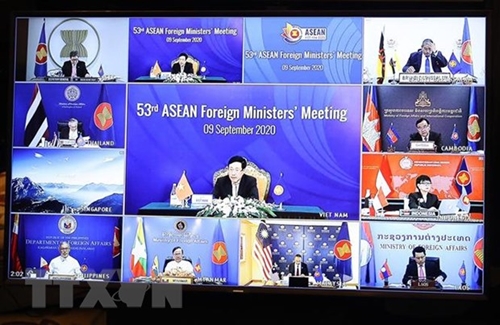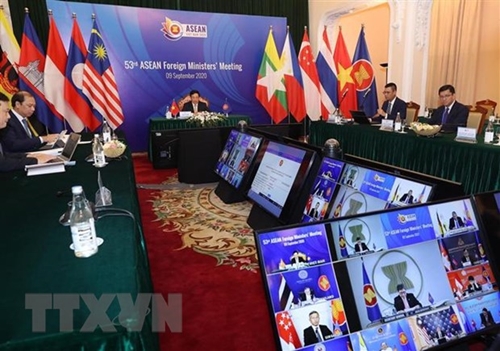During the event, ASEAN foreign ministers said ASEAN has been continuously and actively strengthening cooperation, maintaining the community building momentum as well as effectively responding to the COVID-19 pandemic. Amid developments and increasing uncertainty in the world situation, including the ravaging pandemic, the risk of economic recession and increased competition among major countries, ASEAN has reaffirmed its strong commitment to maintaining the region of peace, stability, security and neutrality, in which international law is highly respected.
    |
 |
|
ASEAN foreign ministers at the meeting |
They agreed to continue efforts to implement the initiatives and priorities for the year, promote cooperation in response to the pandemic, and prepare a comprehensive post-pandemic recovery plan.
The FMs adopted the five-year Work Plan (2021-2025) of the ASEAN Intergovernmental Commission on Human Rights (AICHR) and the AICHR Priority Program in 2021.
Regarding external relations, they recommended conducting the ASEAN - Australia Summit annually, granting the development partnership status to Italy and France, while continuing to consider proposals on becoming ASEAN's full dialogue partners of countries. They also approved measures to improve the ASEAN Regional Forum (ARF) working methods.
Discussing regional and international issues of common concern, the FMs reaffirmed the importance of maintaining and promoting peace, stability, security, safety and freedom of navigation in the East Sea.
They agreed that ASEAN should persistently hold onto its principled position, emphasizing self-restraints, peaceful settlement of all disputes on the basis of international law, including the 1982 UNCLOS.
Participants also reiterated the importance of fully and effectively implementing the Declaration on the Conduct of Parties in the East Sea or South China Sea (DOC), striving to build an effective, substantive Code of Conduct in the East Sea (COC) in accordance with international law and the 1982 UNCLOS.
They agreed that ASEAN needs to continue its efforts to jointly deal with non-traditional security challenges such as terrorism, transnational crime, maritime security and safety, climate change, and epidemics.
    |
 |
|
Deputy Prime Minister and Foreign Minister Pham Binh Minh chairs AMM-53. |
ASEAN countries welcomed Vietnam, as the Chair of ASEAN 2020, for proactively putting forth initiatives, maintaining and promoting the coordination in COVID-19 prevention and control as well as building the ASEAN Community and strengthening the bloc’s centrality.
For his part, Vietnamese Deputy Prime Minister and Foreign Minister Pham Binh Minh suggested ASEAN exert more efforts and strengthen cooperation to overcome difficulties and challenges, maintain the community building, and fully implement priorities and initiatives.
The official asked ASEAN to conduct an overall assessment of foreign relations, build and amend the criteria to consider the admission of a new dialogue partner.
Amid regional and global changes and instability, Minh suggested ASEAN strengthen solidarity and cooperation in views and actions on the basis of agreed principles, including those specified in the Declaration on the Importance of Maintaining Peace and Stability in Southeast Asia on August 8, 2020.
He expressed his concern over complicated developments and serious incidents in the East Sea which run contrary to international law and the 1982 UNCLOS, violate legitimate rights and interests of littoral nations, worsen tensions and cause harms to peace and security in the East Sea.
Minh called on ASEAN to maintain solidarity and principled stance, stressing the bloc needs to continue promoting compliance with international law, particularly the 1982 UNCLOS.
Later the same day, he chaired a series of related meetings via video, including the Meeting of the Southeast Asia Nuclear Weapon-Free Zone (SEANWFZ) Commission, the 27th ASEAN Coordinating Council (ACC) Conference, and the Special Session of the ASEAN Coordinating Council Meeting on Sub-regional Development.
Source: VNA